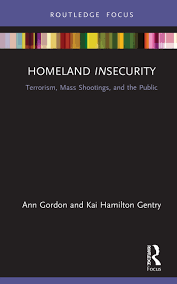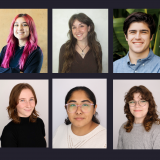
Homeland Insecurity: Terrorism, Mass Shootings and the Public Faculty Books
February 10, 2022
 Between 2009 and 2020, 1,363 people in the United States were killed and 947 more were wounded in 240 mass shootings, an average of 20 shootings each year.
Between 2009 and 2020, 1,363 people in the United States were killed and 947 more were wounded in 240 mass shootings, an average of 20 shootings each year.
The number of terrorist attacks on the United States between 1995 and 2019 totals 856, killing 3,492 Americans.
Despite these trends, most Americans just don’t know what to do if involved in a mass shooting or terror attack, or the role they can play in preventing such violence.
Ann Gordon, Associate Professor (Political Science) in Wilkinson College of Arts, Humanities, and Social Sciences and co-author Kai Hamilton Gentry (’18, Political Science, Chapman University) shine light on how the public has a role to play in ensuring its own security in the event of a mass shooting and/or terror attack with their latest publication, Homeland Insecurity: Terrorism, Mass Shootings and the Public (Routledge, 2021).
The Voice of Wilkinson recently sat down with Dr. Gordon to discuss the book.
Voice of Wilkinson: Why this book, why now?
Ann Gordon: As we were writing the book prospectus, the nation was reeling from two mass shootings in less than 24 hours, which left dozens dead in El Paso, Texas, and Dayton, Ohio. We felt that these attacks added urgency to the need for our research. The project grew out of the ongoing Chapman Survey of American Fears (CSAF), now in its 8th year.
(Learn more about the Chapman Survey of American Fears)
VoW: Tell me about Kai’s involvement with the writings of this book and how you came upon the decision to include him as a co-author?
AG: Kai Hamilton-Gentry was an undergraduate researcher—part of our Team FEAR. He had been working on a number of topics relating to the CSAF, including work on conspiracy theories. This tied in with the topic of mass shootings because new conspiracy theories are born from each mass shooting.
“I am very thankful to have had Dr. Gordon there to guide me during my time as a Fellow and now as a newly published author. It was a surreal experience to write and publish a book over these last few years and it would not have been possible without the skills I learned during my time as a Henley Fellow,” said Hamilton-Gentry.
(Learn more about the Henley Research Lab and becoming a Fellow)
VoW: Many important topics are covered throughout the book. Is there one thing that really stands out to you?
AG: In the book, we explore why so many Americans believe such theories and the harm they do to victims, their families and the public’s understanding of the causes of mass violence. Further, we expose the source of these theories and the gun rights extremists who peddle them, often claiming the attacks never happened and were staged to get sympathy for gun control measures. We also explore the role conspiracy theories, such as QAnon (an umbrella term for a set of conspiracy theories that allege, falsely, that the world is run by a cabal of Satan-worshiping pedophiles) have in motivating violent attacks. We were surprised to learn that 43% of Americans agree or strongly agree that the government is concealing what it knows about mass shootings such as Sandy Hook, Parkland and Las Vegas.
Ultimately, we feel the book is hopeful because we discuss concrete, actionable solutions for educating the public, saving lives and reducing violence due to terrorism and mass shootings.
Sources: Everytown Research & Policy, National Consortium for the Study of Terrorism and Responses to Terrorism (START)


